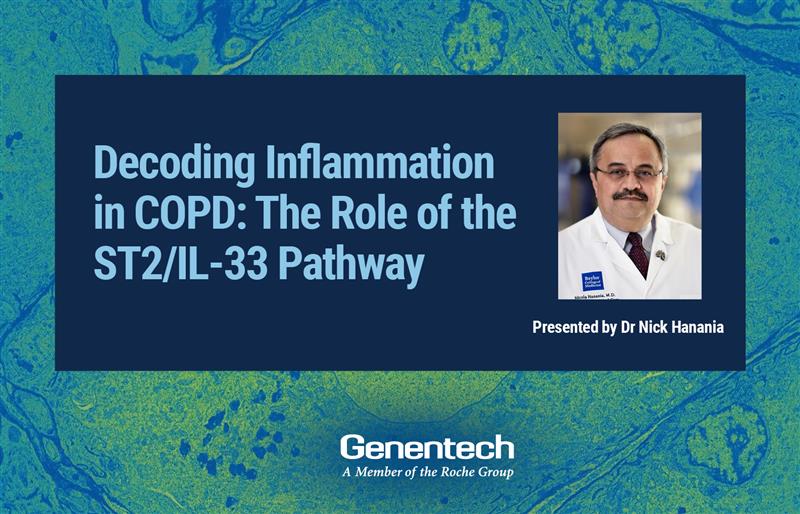Monday, May 19, 2025 | 1:30 PM-2:15 PM PT | Innovation Theater #1
Exacerbations are still a major challenge in the treatment of COPD
Acute exacerbations frequently result in hospital admission and are associated with lung function decline, prolonged negative effects on quality of life, and an increased risk of mortality.1
Unaddressed progressive airway inflammation is the culprit
Neutrophilic inflammation is the predominant inflammation type in 60%-80% of COPD patients.2 With its central role in pathogenesis, addressing it remains a significant unmet need in COPD treatment.3-5 Eosinophilic inflammation is elevated in 20%-40% of patients with COPD with an estimated 20% of patients having a blood eosinophil count ≥300 cells/µL.6,7
The ST2/IL-33 pathway plays a role in the inflammatory pathogenesis of COPD
Patients with COPD have increased ST2 and IL-33 levels compared to healthy individuals, which have been shown to correlate with exacerbation risk and disease severity in COPD.8,9
The ST2/IL-33 pathway is a novel target in COPD
There is an unmet need to develop treatments targeting underlying disease mechanisms and inflammatory pathways involved in COPD.9,10
COPD=chronic obstructive pulmonary disease; IL=interleukin; NIH=National Institutes of Health; ST2=suppression of tumorigenicity 2.
References: 1. Hurst JR, et al. Eur J Intern Med. 2020;73:1-6. 2. Katsoulis O, et al. Nat Commun. 2024;15(1):5766. 3. Yang H, et al. BMJ Open Respir Res. 2023;10(1):e001597. 4. Barnes PJ. J Allergy Clin Immunol. 2016;138(1):16-27. 5. Lonergan M, et al. Respir Res. 2020; 21(1):166. 6. Rabe KF, et al. Am J Respir Crit Care Med. 2023;208(4):395-405. 7. Tashkin DP, Wechsler ME. Int J Chron Obstruct Pulmon Dis. 2018;13:335-349. 8. Joo H, et al. BMC Pulm Med. 2021; 21(1):86. 9. Calderon AA, et al. Eur Respir Rev. 2023;32(167): 220144. 10. Yadav AK, et al. COPD. 2023; 20(1):197–209.
About Dr Nick Alexander Hanania, MD, MS
Dr Hanania is a pulmonary and critical care physician with expertise in airway diseases, including asthma and COPD. He oversees the Airways Clinical Research Center at Baylor College of Medicine which includes a large research team of co-investigators and coordinators. His team is involved in single- and multi-center collaborative clinical trials, funded by the American Lung Association, the NIH, and industry. Dr Hanania’s research is focused primarily on airway pharmacology and is based on translating findings from lab to clinic with the aim of developing new interventions. In addition to his research activities, Dr Hanania is the director of the Asthma and COPD Clinic at the Smith Clinic/Ben Taub Hospital.
M-US-00027250(v1.0) 04/25


